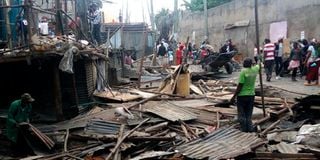Premium
Mukuru demolitions an eye opener on slum landgrabs

Demolished houses at Mukuru-Fuata Nyayo slums in Nairobi.
What you need to know:
- Cartels have infiltrated slums and are now using slum upgrading initiatives as the excuse to displace people.
- In Mukuru, more than 50,000 people have suffered this fate over the past three months.
I have been watching events in Mukuru Kwa Njenga with concern for the past three months. The stories emerging from the slums are those of heartbreak and injustice — a life lost or people injured in a fight between residents and police.
This is due to the evictions that commenced last October, reportedly sanctioned by the government, to pave the way for the Nairobi Expressway.
While this was a noble initiative, crooks who had been illegally allocated the land in question and used road construction as an excuse to evict residents. The government has since been forced to beat a hasty retreat after discovering that the demolitions had crossed boundaries and were infiltrated by rogues. Sadly, this after a death, injuries, destruction of property and displacement of families.
The scenes are not unique to Mukuru; they just exposed what slum dwellers everywhere go through. They always live under the shadow of eviction from the government or land grabbers disguised as private developers. But development, though good, should never be at the expense of humanity.
Having been born and raised in nearby Kibera, said to be Africa’s largest informal settlement, I know Mukuru like the palm of my hand. The eldest of eight children, I experienced extreme poverty and violence, had no formal education as a child, became a street boy at 10 and even joined a gang. I know what is like to be evicted at night with your little personal belongings crushed by bulldozers.
Rendered homeless
Cartels have infiltrated slums and are now using slum upgrading initiatives as the excuse to displace people. In Mukuru, more than 50,000 people have suffered this fate over the past three months. In Kibera five years ago, residents were rendered homeless Mukuru-style, ostensibly for construction of a link road to Langata and Ngong roads that never was.
In the slums are close-knit families with no class, religious or ethnic boundaries. They live in shanties with up to five family members and share a toilet with 50 households. Friendly neighbours borrow minute things like salt and sugar from one another.
But slum upgrading has been going on and I am glad that ‘Big Brother’ has finally caught up with the ruthless, inhumane and selfish land grabbers who subject innocent families to untold suffering.
Reports that President Uhuru Kenyatta visited the area late last month are welcome; he now has the true picture. State officials have been interdicted over the issue. The President has ordered that residents evicted illegally return to their land immediately and the government build houses for them. That is a step in the right direction. Finally, slum residents’ voice will be heard and rights respected.
But more can be done. For instance, the state can compensate those who lost everything. Let the government work with community leaders in an upgrading plan that responds to the residents’ agenda. That is the way to a dignified future for them.
Mr Odede, founder and CEO of Shining Hope For Communities (Shofco), is co-author of the New York Times bestselling book ‘Find Me Unafraid: Love, Loss, and Hope in African Slum’, and winner of several awards. [email protected]





